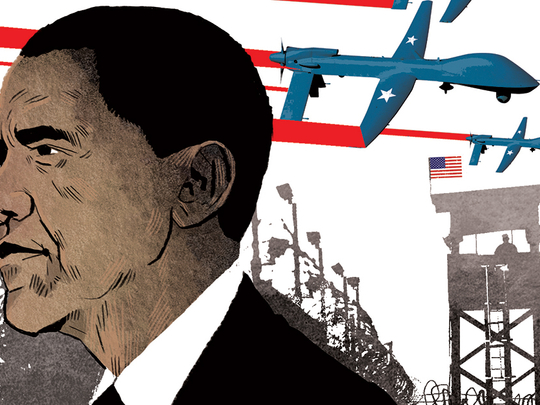
When I talk with friends in the Middle East about Barack Obama’s presidency and its legacy, people invariably bring up two particular things: Guantanamo and drones.
I have been told repeatedly that Obama lied about Guantanamo: he promised to close it, but didn’t. His approach to drone warfare is cited as proof that Obama was never really interested in ending America’s Middle Eastern wars. Instead, one hears, his goal was finding a way to fight them with fewer American casualties.
Let’s consider each of these points. The idea that Obama ‘broke his promise’ to close Guantanamo is deeply embedded in the lore of both the Middle East and of the American Left but the truth has always been more complicated.
People forget today that closing the camp was not particularly controversial back in 2008. Obama’s opponent, Senator John McCain, also favoured doing so.
The minute Obama took office, however, it became a partisan issue. And while Republicans may have thrown up roadblocks as part of their policy of scorched earth opposition to the new administration, Democrats (who, it’s worth remembering, controlled Congress at the time) definitely helped.
In 2010, amid hysterical rhetoric about nearly every inmate at Guantanamo posing an existential threat to the US (a claim even the Bush administration had long ceased making), Congress passed a law effectively forbidding the transfer of Guantanamo inmates to US soil and making it very difficult to send them to other countries. Obama signed it because the measure was part of a broader bill to fund the Defence Department — something he could not possibly veto.
Nevertheless, the number of prisoners at the camp has steadily fallen: from 779 at its peak under Bush to 242 when Obama took office to just 60 today. The camp is still there, but it is much smaller than it once was and, as far as we know, no one has been added to its prisoner rolls for years. Donald Trump has pledged to expand Guantanamo and to resume torturing prisoners, but like so much else about the incoming administration we do not really know what, if anything, he actually plans to do.
Obama has repeatedly expressed regret at his failure to close the camp. One can criticise him for moving too slowly when he first took office, or for not being willing to take risks once the issue became politically tough. But to say, as a surprisingly large number of people do, that Obama never really tried to shut down Guantanamo is simply wrong.
But if it is fair to say that Obama does not deserve much of the criticism directed at him over Guantanamo, it is equally true that he leaves behind a troubling legacy on drones.
As many media outlets, think tanks and advocacy groups have documented America’s use of armed drones has increased vastly over Obama’s eight years in office.
Intrinsic flaws
The administration claims to have made the drone programme far more careful and systematic even as it has vastly expanded its scope. The problem is that this new, supposedly more thoughtful, system is based almost entirely on executive orders and internal policy decisions rather than actual law. That means that for all the talk of committees and careful assessment, it is still a programme that functions largely according to presidential whim.
Put another way: if the people around Trump, some of whom are almost pathologically anti-Muslim, convince him to delegate attack authority to them and then start randomly blowing up anything that piques their suspicion there is not much anyone can do to stop them.
Beyond this there is the problem of precedent. Politicians like drones because they deliver a sense of military accomplishment while putting few, if any, American lives at risk. They are also really, really inexpensive when compared to fighter jets, cruise missiles or putting large numbers of troops on the ground.
But it is these very arguments in their favour that have always counselled caution. It is ridiculous to think other countries will not eventually follow America’s lead in embracing a military technology that is cheap, effective and at least somewhat deniable.
Someday a hostile power is going to use an armed drone to kill someone either in America or on the territory of an American ally. What is the US going to do then? At that moment Washington can expect every argument and rationalisation about terrorism that was ever deployed by both Obama and Bush (and, one assumes, Trump) to be turned back on it.
When it comes to Guantanamo, Obama leaves a troubling legacy, but one at least based on a sincere effort to close the camp.
On drones, however, he has done much to establish a domestic political culture that now considers drone warfare ‘normal’. He leaves behind little that will restrain his successor. He has set precedents that are sure to be thrown back in America’s face, and has done all these things around an easy-to-acquire technology whose cost is dropping rapidly.
For this, history is unlikely to judge Obama kindly.
Gordon Robison, a longtime Middle East journalist and US political analyst, teaches political science at the University of Vermont.









